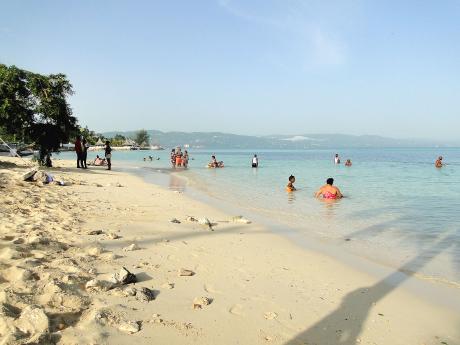Sophia Frazer-Binns | Social partnership on beach access
The outcry over access to public beaches is not new, but it is a response that no leader can ignore.
The information available suggests that an increasing number of Jamaicans are being denied access to, and use of, our beaches, which are some of the most renowned in the world. This 'access denied' phenomenon is primarily because of high entry fees that must be paid by locals to access what is a national good and asset, but it is also because of privatisation, mainly for hotel development and other activities related to tourism product expansion.
With tourism accounting for close to one-third of our gross domestic product (GDP), it is undeniable that our beaches are of great value to Jamaica's economic growth. Notwith-standing, social and environ-mental factors must also be an important part of any consideration on how we use and access our beaches.
With close to 500 miles of coastline, of which approximately 30 per cent is classified as sandy beach, the enjoyment of our beaches and attendant facilities must be seen as an integral part of the rights of all citizens and compel us to find common ground to allow entry for both citizens and tourists.
Modern policy
The cost of properly maintaining our beaches and the Government's inability to absorb such costs cannot be disregarded. Therefore, the time has come for a modern policy governing beach access.
From the inception of the Beach Control Act in 1956, the work by the Natural Resources Conservation Authority in 1997 on a beach policy to address issues surrounding public access continues. The reviews and amendments to the draft policy in 2000 and 2002 remain open. Collectively, as a country, we are yet to arrive at an agreed position of beach access and the orderly development of same. This matter is now impatient of debate and requires immediate action.
One is compelled to look at our Caribbean neighbour Barbados, where, amidst its thriving tourism industry, none of its beaches is considered private. In Barbados, citizens are not restricted from accessing the beaches, and where attempts are made to deny access, they are staunchly resisted. The need to provide locals with unimpeded access to beaches is recognised as a means of social integration between locals and visitors and is a case worth studying.
It is time for the Government of Jamaica and, indeed, Jamaica as whole to examine different ways of facilitating beach access. This should include a revision of how licences are granted and established guidelines governing fee structures and the provision of amenities for our citizens.
A future PNP government will, therefore, covenant with the people to review existing laws, policies and guidelines governing the use and access to our beaches. We will endeavour to enter into a social partnership underpinned by open and honest communication among all Jamaicans, especially those in communities in close proximity to beaches. This commitment will be driven by a set of principles that allow for:
- Updating the inventory of public beaches and ensuring regular monitoring.
- The assurance that future beach acquisitions/leases of public beaches include an easement for the public to access the beaches, including preserving traditional fishing beaches.
- Proactive assistance for communities in securing prescriptive rights of access.
- Identifying a model for public use that will allow for income generation - recognising that there may be more than one model that may be appropriate for the different beaches we have, such as free access, but charges for use of facilities (e.g., bathrooms, changing rooms, beach chairs, etc.).
The protection of the beach infrastructure and restoration of coastal resources and for controlled recreation and beach activities.
While these are not exhaustive, the Opposition recognises that like land, our beaches are to be enjoyed by all, and no one should be excluded because of privatisation or exorbitant entry fees. At the same time, however, a balance must be arrived at on how we preserve our beaches and improve infrastructure to make them accessible to all, while creating a space for all Jamaicans and visitors alike to access our beaches and feel all right.
- Senator Sophia Frazer-Binns is shadow minister on land and the environment. Email feedback to columns@gleanerjm.com.


